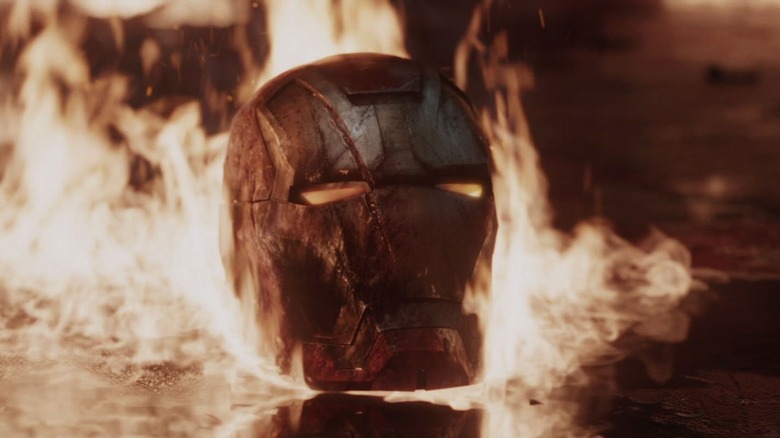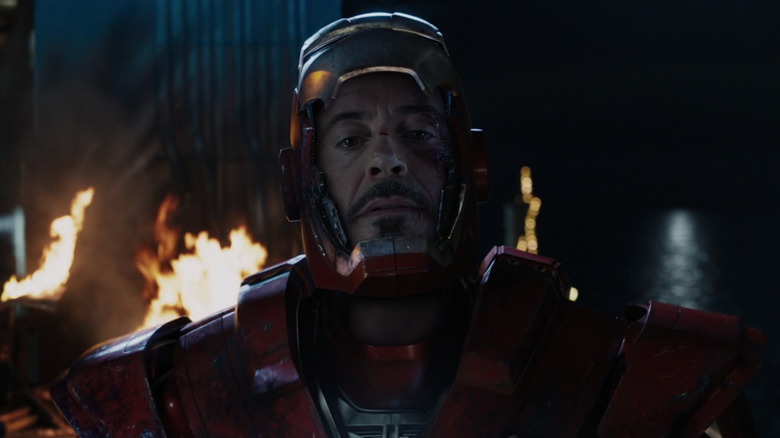How Robert Downey Jr. Kept The Avengers Together When Marvel Was Being Cheap
Given how much money the Marvel Cinematic Universe made in its overwhelmingly successful first 15 years, it's astonishing to think how (relatively) little some of its stars were paid. Many felt that Robert Downey, Jr., who played Tony Stark/Iron Man in multiple MCU movies, was indispensable, seeing as his flippant humor and stern heroism were vital to making the series work. His "Iron Man" salary was a mere $500,000, but that number went up exponentially as the "Avengers" sequels rolled in, usually raking it billions. As such, Downey was paid hand-over-fist for his work, sometimes earning as much as $80 million for a single feature. He also received a cut of the profits on certain "Avengers" sequels.
Several of Downey's co-stars, however, earned considerably less. Scarlett Johansson, who played the black-clad spy Black Widow, received a mere $1 million for "Avengers: Age of Ultron." A hefty salary to be sure, but a sight less than Downey's $10 million, plus a cut of the profits that netted him another $40 million. Chris Evans (Captain America), Chris Hemsworth (Thor), and Jeremy Renner (Hawkeye) similarly earned about $3 million each for "The Avengers."
Other late additions to the MCU also earned a lot less. Karen Gillan (Nebula) reportedly earned under $12 million for all her MCU appearances combined, while Bradley Cooper made upwards of $30 million for all his voice performances as Rocket Raccoon.
In 2013, as Downey was making "Iron Man 3," it was revealed by Deadline that the actor had struck another plum deal, netting him many more millions. He also found himself in a position stand up for co-stars. Indeed, several (unnamed) talent representatives spoke with Deadline and they implied that Downey was ineffably present to add pressure to certain contract negotiations.
'F*** you, call Robert'
Also, because Downey was the star of Jon Favreau's 2008 film "Iron Man," the film that kicked off the MCU in earnest, he was seen as the "original member." It was his character that had audience's imaginations inflamed with the possibility of an "Avengers" team-up film. When Disney purchased Marvel in 2009, plans for multiple "Avengers" movies were planned in earnest, and Downey was to lead the charge in all the crossovers. As such, he was in a much more secure position to dictate terms ... much to Disney's consternation. Downey called himself a "strategic cost" for the studio, adding that Disney was "pissed" at his $50 million payout for certain movies.
As the leader of the Avengers both on and off-screen, Downey knew that he could walk out on the series — or renegotiate his own contract — if the studio threatened to cut or underpay one of his co-stars. As an anonymous source noted:
"[Downey is] the only guy with real power in this situation. And balls of steel, too. He's already sent a message that he's not going to work for a place where they treat his colleagues like s***."
Another source, also anonymous, said that there was an unspoken, and rather succinct, rule to follow during an actor salary dispute: "I have four words for Marvel — 'F*** you, call Robert.'" It's unlikely that Downey sat in the room when other actors were signing their contracts, of course, but that any one of the cast members could — at any moment — go over the studio's head and ask Downey for some moral support was likely threatening.
The MCU's future, as of 2024, is decidedly hazy. But, golly, think of all the money it's already made.

